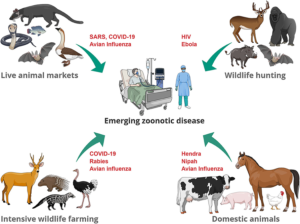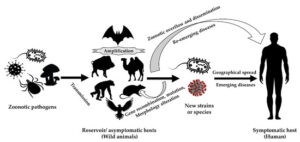Back to: ZOOLOGY 200 Level
I’m really proud of the dedication you’re showing. Today, we’ll be learning about something very important and practical—Diseases caused by parasites and their control measures. These diseases affect not only humans but also animals and even the economy. Let’s understand how they occur and how we can stop them.
Diseases caused and control measures
Common diseases caused by parasites
Parasites can cause various diseases in humans and animals by damaging tissues, stealing nutrients, or releasing toxins. Let’s look at some well-known examples:

Schistosomiasis:
This is caused by blood flukes (genus Schistosoma). It’s common in areas with freshwater bodies where people bathe or fetch water. The parasite enters the skin and travels to organs like the liver or bladder. It can cause stomach pain, bloody urine, and long-term organ damage.
Taeniasis and Cysticercosis:
These are caused by the tapeworm Taenia solium. Humans get infected by eating undercooked pork containing cysts. The adult worm grows in the intestines (taeniasis), and if the eggs are swallowed, they can develop into cysts in body tissues (cysticercosis), even the brain.
Malaria:
Although caused by a protozoan (Plasmodium), it’s transmitted by the female Anopheles mosquito. It causes fever, chills, body pain, and if untreated, can lead to death.
Ascariasis:
Caused by roundworms (Ascaris lumbricoides), this disease is spread through contaminated food or water. The worms grow in the intestines and may cause malnutrition, pain, and even blockages.
How to control parasitic diseases
There are several effective ways to prevent or reduce the spread of these diseases:
Improved hygiene and sanitation:
Washing hands before meals, using clean toilets, and proper disposal of human and animal waste help stop parasites from spreading.
Proper cooking of food:
Thoroughly cooking meat, especially pork and beef, kills parasite larvae and eggs that could cause diseases like taeniasis.
Use of protective clothing and insecticides:
Wearing long-sleeved clothes, sleeping under mosquito nets, and using insect repellents help prevent malaria.
Public health education:
Teaching communities about how parasites spread and how to avoid them is one of the best long-term solutions.

Mass deworming programmes:
In schools and rural areas, governments and NGOs sometimes organise deworming exercises to treat children for intestinal parasites.
Environmental management:
Draining stagnant water and proper refuse disposal reduces the breeding grounds for mosquitoes and other disease-carrying vectors.
Summary
Parasites cause a range of diseases like schistosomiasis, taeniasis, malaria, and ascariasis. These diseases can lead to serious health problems if not treated. However, through good hygiene, cooking food properly, avoiding contaminated water, and educating people, we can effectively control and prevent them.
Evaluation
- Name two parasitic diseases and their causative organisms.
- How can malaria be prevented?
- What role does hygiene play in controlling parasitic infections?
- Why is it important to cook meat thoroughly?
You’re gaining powerful knowledge that protects lives. Keep this energy alive as you continue learning with Afrilearn. You’re not just studying—you’re growing into a confident, informed leader. Shall we continue with the next topic?
